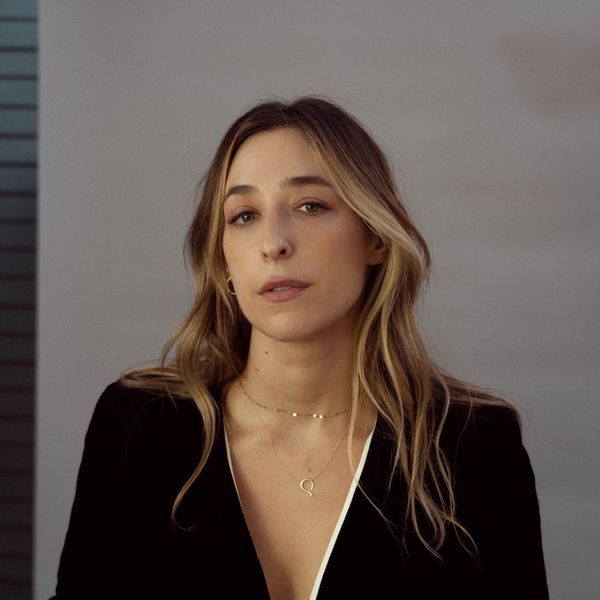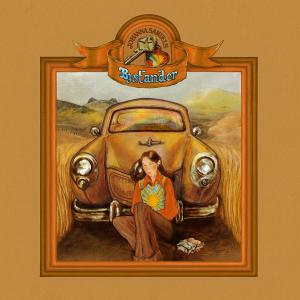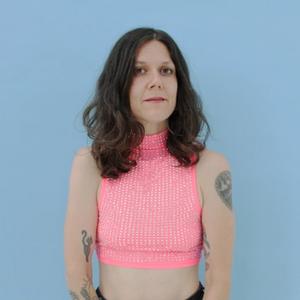




Link copied

Johanna Samuels’ debut LP, Excelsior!, is one of this year’s quiet masterpieces. Raw and unflinchingly honest, it turns inwards to examine the darker sides of success and back outwards to ponder the state of the world, only to find it mirroring her own feelings and experiences. Driven by Samuels’ arresting melodies and vulnerable delivery - with songs like ‘High Tide For One’ - it’s an album that places the experiences of women in modern America very much at its centre.
“To be honest, I was in a very dark place [when writing the album]. Socially, I felt really alone”, she says. “I had a lot of people in my life that were not supposed to be in my life, and alongside dealing with that I was also glimpsing a lot of the darker elements of the music industry. I was witnessing a lot of unkind, toxic behaviour, and was trying to work out how I could be a person that I'm proud of and be a musician at the same time.”
“As I zoomed out, I noticed the same pattern everywhere in the country; a similar kind of value system that was struggling in balance. So I just tried to purge that. I didn't really know that that's what I was trying to get out, but in retrospect it's weird. I listen to a lot of the songs now, and I'm like, ‘Oh, I was writing about the future’. I had no idea.”
Born in New York, she currently splits her time between the city and her adopted home in LA. The album was recorded deep in winter, snowed in at producer Sam Evian’s upstate New York cabin. Catching up, Holler sat down with Johanna to talk about the musical influences that have shaped her artistry and how they fed into to the writing on Excelsior!.
“These songs have been a part of my life, for most of my life. I guess the peak of my musical brain explosion - I feel like we all have them at different periods in our lives - was when I was a teen and then as a 22-year-old. I feel like that's when I found the music that is a part of my fibre”.

Elliott Smith - 'Happiness'
I found out about Elliott Smith when I was probably 13 or 14. I read an interview with another band singer I was obsessed with, and they listed him as someone that inspired them. Figure 8 had just come out, so I found it and listened to ‘Stupidity Tries’ first – I’d never heard chords like that, and what he was saying was so raw and honest. I was hooked on him immediately. In ‘Happiness’, the breakdown and refrain at the end - “What I used to be will pass away and then you'll see that all I want now is happiness for you and me” – reminds me of the end of The Beatles’ Abbey Road - “and in the end, the love you take is equal to the love you make”. To me, they are those universally epic statements that kind of sum up human nature.
I was heartbroken when he passed away because he was like a life raft to me. I was in 10th grade and feeling very alone, and he really was a buoyancy for my sense of hope and belonging. I remember I ran into my parents’ room and told them Elliott Smith had died, and they were like, “Oh, my God, is that a boy from your school?” I wore black for like two weeks.
Later on in life, in my early twenties, I found John Brion. Every Friday night I’d religiously go to this venue called Largo in LA to see him play these incredible shows. Though they were best friends and collaborated a lot, he rarely talked about Elliott, but this one night he just opened up about him. It was October 21st - the date that Elliott passed away - and he ended up playing ‘Visions Of Johannah’ and ‘Happiness’ braided together. All of a sudden that song took on a new meaning to me. It pushed me forward in my musical life. Elliott was someone that I came across when I didn't have the courage, sense of self or competence to write my own songs, and then when that happened, I suddenly had this blessing, it felt like, to marry those two parts of myself.
Bob Dylan - 'Visions of Johanna'
Bob Dylan has always been a part of me - I’m named after this song. He was this fixture in our house that I saw through the lens of my dad, mostly. As I’ve become a woman, I've had so many different relationships with ‘Visions of Johanna’. Because, on one hand, it's like the ultimate romantic statement - it's so heartbreaking and it cosmically encapsulates a lot of human experience and connection. Then, on the other hand, it is Bob Dylan, who was a white guy who was probably not cool to a lot of women.
I think about the Louise of the song all the time. She’s also a fixture in my archetypal lens as I make sense of the world. It’s not great to be Louise - also, I would love it if Johanna was Johanna and not a vision of Johanna.
But Bob Dylan is a prophet of our generation and the generation before us. He is a prophet. Lyrically I had never experienced anything so vivid. He was the person that kind of gave me lyrics, which became my alley into songwriting. I grew up learning everyone else's chords on the piano because I was obsessed with them, but all of a sudden Bob Dylan blew the door open for me in terms of how words can fit together like puzzle pieces and express something way more profound than if you're trying to stick to regular sentences.
Marvin Gaye - 'Inner City Blues'
I came to this song late. After George Floyd was killed, a lot of context came back into play about how, systemically, there's so much that is actively avoided when it comes to understanding how history has worked. We’re ignorant of the horrible parts, the abuse that Black people have suffered and undergone, but also of how everything great about our country is built on the backs of Black people.
I didn't know much Marvin Gaye, except for the golden oldies and Motown stuff from having heard it on the radio. But ‘Inner City Blues’ was never something that was played on there because it's a depiction of something really ugly in America.
Towards the end of my time at school, I ended up taking this class called Motown. The teacher centred the whole class around What's Going On? as a concept - how Motown led up to the creation of the record and what happened after. I was 21, and I had never heard a recording like it – especially ‘Inner City Blues’.
It felt like I was above the clouds but also transported and given a real glimpse into the streets and what Marvin was singing about: this whole universe, which because of my white privilege, I had no idea of the reality of.
The way that Marvin Gaye wanted to be a crooner but evolved into the artist he became is one of the most incredible American stories to me.
Nina Simone - 'I Wish I Knew How It Would Feel To Be Free'
Nina Simone’s voice could cut through glass to the back of whatever room; it’s like an undeniable force. Her performance of this song is so sad but it’s also so strong - everything she ever sang she did so with strength. Nina’s one of those artists where it’s such an authentic expression of herself; even if she’s singing standards that have existed for a long time, she makes every song her own. She was such a complicated person and I love that about her art.
She was a Black person in America as the beginnings of Civil Rights were coming to fruition and she instantly became this leader in that. She just had this unapologetic presence in whatever she was doing and because of that, she took up undeniable space. I think that’s dope.
The Beach Boys - 'Surf's Up'
I was obsessed with Pet Sounds in my teens for so many reasons. I could hear that he was exploring depression, but Surf’s Up felt like something splitting - I didn’t even know at the time that this was the record that was the end of The Beach Boys. The last two songs – ‘Til I Die’ and how it bleeds into ‘Surf’s Up’ – really shredded my brain.
Brian’s musical journey into the depths of mental illness reflects the darkest element of fame, which is something that I want to be very aware of. Mental illness, being a musician and then the prospect of fame and recognition is a cocktail that I really want to be wary of for the rest of my life. I think Elliott Smith dealt with a lot of this as well. ‘Surf’s Up’ is profound and heart-breaking; an audio journey, like a movie or a ride at Disneyland or something. Not a lot of songs do that.
---
Johanna Samuel's debut LP, Excelsior!, is out now via Mama Bird Recordings.





